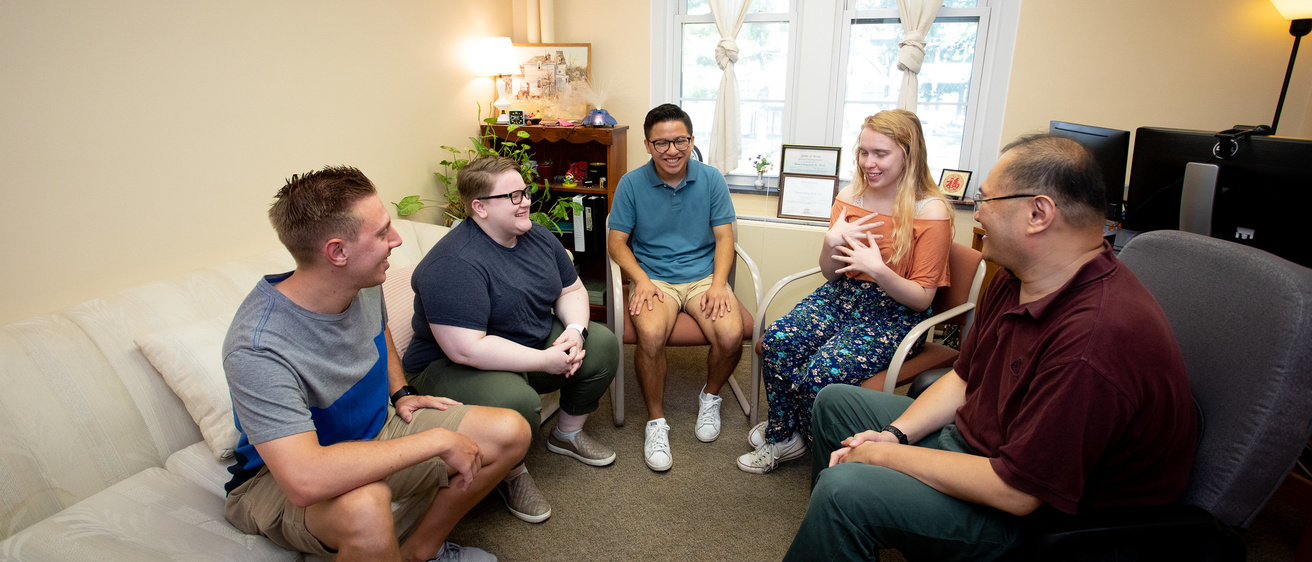Group therapy descriptions
General Therapy Group
Open to graduate and undergraduate students of all genders, general therapy groups tend to focus on relationships, intimacy, boundaries, self-awareness and other components of interpersonal process. These groups are designed to help members learn to deal with a variety of concerns including feelings of depression and anxiety, relationship issues, and other personal and academic concerns.
Men’s Therapy Group
In this group, members have the opportunity to form close relationships with each other, to realize that they are not alone with their problems, issues, and concerns. Members will receive support and discover that others also struggle with not being able to get in touch with their feelings, or to identify and know that they are, in fact, anxious or depressed, or full of anger or sadness. This group is open to trans-men and cis-men.
General Therapy Group: Black Students General Process Group
The Black Student Therapy Group will serve as a space for Black identifying students of all gender identities to respectfully listen to each other, share thoughts, feelings, provide validation, and offer encouragement to fellow Black students at the University of Iowa. The group is open for Black students to discuss a wide variety of presenting concerns, including, but not limited to anxiety, depression, relationship concerns, and serve as a space for Black students to process the violence, police brutality, and racism experienced during this time of social and political unrest as it relates to the Black Lives Matter movement.
Expressive Arts Therapy Group
Expressive Arts Therapy group uses various mediums (clay, painting, mask making, and other) in a supportive setting to facilitate self-awareness, growth, and healing/stress-reduction. In this group, members have the opportunity to use their own creative, emotional, and intuitive aspects to discover and express themselves. This group is helpful to address concerns of, but is not limited to, assertiveness, social anxiety and isolation, identity development, emotional regulation, self-esteem, and create meaning to one’s experience through engaging in an expressive arts intervention and group processing after the activity. No previous experience with art is needed.
Women's Therapy Group
In this group, members have the opportunity to focus on interpersonal skills, address low self-esteem or low self-confidence, explore trauma experiences, develop assertiveness skills, and address issues related to depression and anxiety. Women support women in addressing personal issues and impact of sociocultural structures on their identity and coping. This group is open to trans-women and cis-women.
Myself & My Body Therapy Group
The Myself and My Body therapy group is designed to provide a safe and supportive space for individuals who are recovering from eating disorders, disordered eating, and/or body dissatisfaction. In this group members will learn how to improve our relationships with our bodies, food, and/or exercise. They will identify disordered eating cycle and learn ways to disrupt the pattern. Also, members will explore emotional experiences and its relation to eating and body concerns. Members will support each other towards recovery.
Graduate, Professional Student, and Postdoc Therapy Group
In this group, graduate students, professional students, and postdocs will have the opportunity to engage in self- and interpersonal-exploration and processing. All members may bring different types of concerns and topics to the group, as the spirit of an interpersonal processing group focuses not only on the content of what we discuss, but how we interact with one another within the group. Group members will be able to examine interpersonal and relationship patterns, receive feedback and support from others, and develop awareness and new ways they may wish to approach stressors and people in their lives. Undoubtedly, themes specific to graduate students, professional students, and postdocs may arise, including work/life balance, advisory/supervisor relationships, imposter syndrome, self-confidence, navigating cultural differences and adjustments, and more. This group is open to graduate students, professional students, and postdocs of any identities, any area of study, and any phase of their academic development.
Sisters in Law Therapy Group
This group will provide a space for students to support each other as they process the challenges of being a woman in law school and other life stressors. Non-binary and transgender folx are welcome to join. Fridays from 12:45 to 1:45. If interested, email Social Worker Sam.
